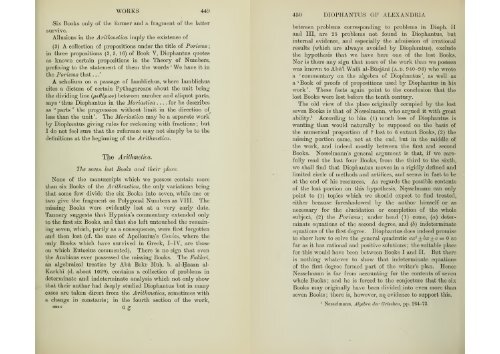A history of Greek mathematics Vol.II from Aristarchus to Diophantus by Heath, Thomas Little, Sir, 1921
MACEDONIA is GREECE and will always be GREECE- (if they are desperate to steal a name, Monkeydonkeys suits them just fine) ΚΑΤΩ Η ΣΥΓΚΥΒΕΡΝΗΣΗ ΤΩΝ ΠΡΟΔΟΤΩΝ!!! ΦΕΚ,ΚΚΕ,ΚΝΕ,ΚΟΜΜΟΥΝΙΣΜΟΣ,ΣΥΡΙΖΑ,ΠΑΣΟΚ,ΝΕΑ ΔΗΜΟΚΡΑΤΙΑ,ΕΓΚΛΗΜΑΤΑ,ΔΑΠ-ΝΔΦΚ, MACEDONIA,ΣΥΜΜΟΡΙΤΟΠΟΛΕΜΟΣ,ΠΡΟΣΦΟΡΕΣ,ΥΠΟΥΡΓΕΙΟ,ΕΝΟΠΛΕΣ ΔΥΝΑΜΕΙΣ,ΣΤΡΑΤΟΣ, ΑΕΡΟΠΟΡΙΑ,ΑΣΤΥΝΟΜΙΑ,ΔΗΜΑΡΧΕΙΟ,ΝΟΜΑΡΧΙΑ,ΠΑΝΕΠΙΣΤΗΜΙΟ,ΛΟΓΟΤΕΧΝΙΑ,ΔΗΜΟΣ,LIFO,ΛΑΡΙΣΑ, ΠΕΡΙΦΕΡΕΙΑ,ΕΚΚΛΗΣΙΑ,ΟΝΝΕΔ,ΜΟΝΗ,ΠΑΤΡΙΑΡΧΕΙΟ,ΜΕΣΗ ΕΚΠΑΙΔΕΥΣΗ,ΙΑΤΡΙΚΗ,ΟΛΜΕ,ΑΕΚ,ΠΑΟΚ,ΦΙΛΟΛΟΓΙΚΑ,ΝΟΜΟΘΕΣΙΑ,ΔΙΚΗΓΟΡΙΚΟΣ,ΕΠΙΠΛΟ, ΣΥΜΒΟΛΑΙΟΓΡΑΦΙΚΟΣ,ΕΛΛΗΝΙΚΑ,ΜΑΘΗΜΑΤΙΚΑ,ΝΕΟΛΑΙΑ,ΟΙΚΟΝΟΜΙΚΑ,ΙΣΤΟΡΙΑ,ΙΣΤΟΡΙΚΑ,ΑΥΓΗ,ΤΑ ΝΕΑ,ΕΘΝΟΣ,ΣΟΣΙΑΛΙΣΜΟΣ,LEFT,ΕΦΗΜΕΡΙΔΑ,ΚΟΚΚΙΝΟ,ATHENS VOICE,ΧΡΗΜΑ,ΟΙΚΟΝΟΜΙΑ,ΕΝΕΡΓΕΙΑ, ΡΑΤΣΙΣΜΟΣ,ΠΡΟΣΦΥΓΕΣ,GREECE,ΚΟΣΜΟΣ,ΜΑΓΕΙΡΙΚΗ,ΣΥΝΤΑΓΕΣ,ΕΛΛΗΝΙΣΜΟΣ,ΕΛΛΑΔΑ, ΕΜΦΥΛΙΟΣ,ΤΗΛΕΟΡΑΣΗ,ΕΓΚΥΚΛΙΟΣ,ΡΑΔΙΟΦΩΝΟ,ΓΥΜΝΑΣΤΙΚΗ,ΑΓΡΟΤΙΚΗ,ΟΛΥΜΠΙΑΚΟΣ, ΜΥΤΙΛΗΝΗ,ΧΙΟΣ,ΣΑΜΟΣ,ΠΑΤΡΙΔΑ,ΒΙΒΛΙΟ,ΕΡΕΥΝΑ,ΠΟΛΙΤΙΚΗ,ΚΥΝΗΓΕΤΙΚΑ,ΚΥΝΗΓΙ,ΘΡΙΛΕΡ, ΠΕΡΙΟΔΙΚΟ,ΤΕΥΧΟΣ,ΜΥΘΙΣΤΟΡΗΜΑ,ΑΔΩΝΙΣ ΓΕΩΡΓΙΑΔΗΣ,GEORGIADIS,ΦΑΝΤΑΣΤΙΚΕΣ ΙΣΤΟΡΙΕΣ, ΑΣΤΥΝΟΜΙΚΑ,ΦΙΛΟΣΟΦΙΚΗ,ΦΙΛΟΣΟΦΙΚΑ,ΙΚΕΑ,ΜΑΚΕΔΟΝΙΑ,ΑΤΤΙΚΗ,ΘΡΑΚΗ,ΘΕΣΣΑΛΟΝΙΚΗ,ΠΑΤΡΑ, ΙΟΝΙΟ,ΚΕΡΚΥΡΑ,ΚΩΣ,ΡΟΔΟΣ,ΚΑΒΑΛΑ,ΜΟΔΑ,ΔΡΑΜΑ,ΣΕΡΡΕΣ,ΕΥΡΥΤΑΝΙΑ,ΠΑΡΓΑ,ΚΕΦΑΛΟΝΙΑ, ΙΩΑΝΝΙΝΑ,ΛΕΥΚΑΔΑ,ΣΠΑΡΤΗ,ΠΑΞΟΙ
MACEDONIA is GREECE and will always be GREECE- (if they are desperate to steal a name, Monkeydonkeys suits them just fine)
ΚΑΤΩ Η ΣΥΓΚΥΒΕΡΝΗΣΗ ΤΩΝ ΠΡΟΔΟΤΩΝ!!!
ΦΕΚ,ΚΚΕ,ΚΝΕ,ΚΟΜΜΟΥΝΙΣΜΟΣ,ΣΥΡΙΖΑ,ΠΑΣΟΚ,ΝΕΑ ΔΗΜΟΚΡΑΤΙΑ,ΕΓΚΛΗΜΑΤΑ,ΔΑΠ-ΝΔΦΚ, MACEDONIA,ΣΥΜΜΟΡΙΤΟΠΟΛΕΜΟΣ,ΠΡΟΣΦΟΡΕΣ,ΥΠΟΥΡΓΕΙΟ,ΕΝΟΠΛΕΣ ΔΥΝΑΜΕΙΣ,ΣΤΡΑΤΟΣ, ΑΕΡΟΠΟΡΙΑ,ΑΣΤΥΝΟΜΙΑ,ΔΗΜΑΡΧΕΙΟ,ΝΟΜΑΡΧΙΑ,ΠΑΝΕΠΙΣΤΗΜΙΟ,ΛΟΓΟΤΕΧΝΙΑ,ΔΗΜΟΣ,LIFO,ΛΑΡΙΣΑ, ΠΕΡΙΦΕΡΕΙΑ,ΕΚΚΛΗΣΙΑ,ΟΝΝΕΔ,ΜΟΝΗ,ΠΑΤΡΙΑΡΧΕΙΟ,ΜΕΣΗ ΕΚΠΑΙΔΕΥΣΗ,ΙΑΤΡΙΚΗ,ΟΛΜΕ,ΑΕΚ,ΠΑΟΚ,ΦΙΛΟΛΟΓΙΚΑ,ΝΟΜΟΘΕΣΙΑ,ΔΙΚΗΓΟΡΙΚΟΣ,ΕΠΙΠΛΟ, ΣΥΜΒΟΛΑΙΟΓΡΑΦΙΚΟΣ,ΕΛΛΗΝΙΚΑ,ΜΑΘΗΜΑΤΙΚΑ,ΝΕΟΛΑΙΑ,ΟΙΚΟΝΟΜΙΚΑ,ΙΣΤΟΡΙΑ,ΙΣΤΟΡΙΚΑ,ΑΥΓΗ,ΤΑ ΝΕΑ,ΕΘΝΟΣ,ΣΟΣΙΑΛΙΣΜΟΣ,LEFT,ΕΦΗΜΕΡΙΔΑ,ΚΟΚΚΙΝΟ,ATHENS VOICE,ΧΡΗΜΑ,ΟΙΚΟΝΟΜΙΑ,ΕΝΕΡΓΕΙΑ, ΡΑΤΣΙΣΜΟΣ,ΠΡΟΣΦΥΓΕΣ,GREECE,ΚΟΣΜΟΣ,ΜΑΓΕΙΡΙΚΗ,ΣΥΝΤΑΓΕΣ,ΕΛΛΗΝΙΣΜΟΣ,ΕΛΛΑΔΑ, ΕΜΦΥΛΙΟΣ,ΤΗΛΕΟΡΑΣΗ,ΕΓΚΥΚΛΙΟΣ,ΡΑΔΙΟΦΩΝΟ,ΓΥΜΝΑΣΤΙΚΗ,ΑΓΡΟΤΙΚΗ,ΟΛΥΜΠΙΑΚΟΣ, ΜΥΤΙΛΗΝΗ,ΧΙΟΣ,ΣΑΜΟΣ,ΠΑΤΡΙΔΑ,ΒΙΒΛΙΟ,ΕΡΕΥΝΑ,ΠΟΛΙΤΙΚΗ,ΚΥΝΗΓΕΤΙΚΑ,ΚΥΝΗΓΙ,ΘΡΙΛΕΡ, ΠΕΡΙΟΔΙΚΟ,ΤΕΥΧΟΣ,ΜΥΘΙΣΤΟΡΗΜΑ,ΑΔΩΝΙΣ ΓΕΩΡΓΙΑΔΗΣ,GEORGIADIS,ΦΑΝΤΑΣΤΙΚΕΣ ΙΣΤΟΡΙΕΣ, ΑΣΤΥΝΟΜΙΚΑ,ΦΙΛΟΣΟΦΙΚΗ,ΦΙΛΟΣΟΦΙΚΑ,ΙΚΕΑ,ΜΑΚΕΔΟΝΙΑ,ΑΤΤΙΚΗ,ΘΡΑΚΗ,ΘΕΣΣΑΛΟΝΙΚΗ,ΠΑΤΡΑ, ΙΟΝΙΟ,ΚΕΡΚΥΡΑ,ΚΩΣ,ΡΟΔΟΣ,ΚΑΒΑΛΑ,ΜΟΔΑ,ΔΡΑΜΑ,ΣΕΡΡΕΣ,ΕΥΡΥΤΑΝΙΑ,ΠΑΡΓΑ,ΚΕΦΑΛΟΝΙΑ, ΙΩΑΝΝΙΝΑ,ΛΕΥΚΑΔΑ,ΣΠΑΡΤΗ,ΠΑΞΟΙ
You also want an ePaper? Increase the reach of your titles
YUMPU automatically turns print PDFs into web optimized ePapers that Google loves.
WORKS<br />
44 ( J<br />
Six Books only <strong>of</strong> the former and a fragment <strong>of</strong> the latter<br />
survive.<br />
Allusions in the Arithmetica imply the existence <strong>of</strong><br />
(3) A collection <strong>of</strong> propositions under the title <strong>of</strong> Porisms ;<br />
in three propositions (3, 5, 16) <strong>of</strong> Book V, <strong>Diophantus</strong> quotes<br />
as known certain propositions in the Theory <strong>of</strong> Numbers,<br />
prefixing <strong>to</strong> the statement <strong>of</strong> them the words We have '<br />
it in<br />
.'<br />
the Porisms that . .<br />
A scholium on a passage <strong>of</strong> Iamblichus, where Iamblichus<br />
cites a dictum <strong>of</strong> certain Pythagoreans about the unit being<br />
the dividing line (fieOopLov) between number and aliquot parts,<br />
says thus <strong>Diophantus</strong> in the Moriastica .... for he describes<br />
'<br />
as " parts " the progression without limit in the direction <strong>of</strong><br />
less than the unit The Moriastica may be a separate work<br />
'.<br />
<strong>by</strong> <strong>Diophantus</strong> giving rules for reckoning with fractions ; but<br />
I do not feel sure that the reference may not simply be <strong>to</strong> the<br />
definitions at the beginning <strong>of</strong> the Arithmetica.<br />
The seven lost<br />
The Arithmetica.<br />
Books and their place.<br />
None <strong>of</strong> the manuscripts which we possess contain more<br />
than six Books <strong>of</strong> the Arithmetica, the only variations being<br />
that some few divide the six Books in<strong>to</strong> seven, while one or<br />
two give the fragment on Polygonal Numbers as V<strong>II</strong>I. The<br />
missing Books were evidently lost at a very early date.<br />
Tannery suggests that Hypatia's commentary extended only<br />
<strong>to</strong> the first six Books, and that she left un<strong>to</strong>uched the remaining<br />
seven, which, partly as a consequence, were first forgotten<br />
and then lost (cf. the case <strong>of</strong> Apollonius's Conies, where the<br />
only Books which have survived in <strong>Greek</strong>, I-IV, are those<br />
on which Eu<strong>to</strong>cius commented). There is no sign that even<br />
the Arabians ever possessed the missing Books. The Fakhra,<br />
an algebraical treatise <strong>by</strong> Abu Bekr Muh. b. al-Hasan al-<br />
Karkhi (d. about 1029), contains a collection <strong>of</strong> problems in<br />
determinate and indeterminate analysis which not only show<br />
that their author had deeply studied <strong>Diophantus</strong> but in many<br />
cases are taken direct <strong>from</strong> the Arithmetica, sometimes with<br />
a change in constants; in the fourth section <strong>of</strong> the work,<br />
1523.2 Q g<br />
450 DIOPHANTUS OF ALEXANDRIA<br />
between problems corresponding <strong>to</strong> problems in Dioph. <strong>II</strong><br />
and <strong>II</strong>I, are 25 problems not found in <strong>Diophantus</strong>, but<br />
internal evidence, and especially the admission <strong>of</strong> irrational<br />
results (which are always avoided <strong>by</strong> <strong>Diophantus</strong>), exclude<br />
the hypothesis that we have here one <strong>of</strong> the lost Books.<br />
Nor is there any sign that more <strong>of</strong> the work than we possess<br />
was known <strong>to</strong> Abul Wafa al-Buzjani (a.d. 940-98) who wrote<br />
a commentary on the algebra <strong>of</strong> <strong>Diophantus</strong> ' ', as well as<br />
a Book <strong>of</strong> pro<strong>of</strong>s <strong>of</strong> propositions used <strong>by</strong> <strong>Diophantus</strong> '<br />
in his<br />
work'. These facts again point <strong>to</strong> the conclusion that the<br />
lost Books were lost before the tenth century.<br />
The old view <strong>of</strong> the place originally occupied <strong>by</strong> the lost<br />
seven Books is that <strong>of</strong> Nesselmann, who argued it with great<br />
ability. 1 According <strong>to</strong> him (1) much less <strong>of</strong> <strong>Diophantus</strong> is<br />
wanting than would naturally be supposed on the basis <strong>of</strong><br />
the numerical proportion <strong>of</strong> 7 lost <strong>to</strong> 6 extant Books, (2) the<br />
missing portion came, not at the end, but in the middle <strong>of</strong><br />
the work, and indeed mostly between the first and second<br />
Books. Nesselmann's general argument is that, if we carefully<br />
read the last four Books, <strong>from</strong> the third <strong>to</strong> the sixth,<br />
we shall find that <strong>Diophantus</strong> moves in a rigidly defined and<br />
limited circle <strong>of</strong> methods and artifices, and seems in fact <strong>to</strong> be<br />
at the end <strong>of</strong> his resources. As regards the possible contents<br />
<strong>of</strong> the lost portion on this hypothesis, Nesselmann can only<br />
point <strong>to</strong> (1) <strong>to</strong>pics which we should expect <strong>to</strong> find treated,<br />
either because foreshadowed <strong>by</strong> the author himself or as<br />
necessary for the elucidation or completion <strong>of</strong> the whole<br />
subject, (2) the Porisms; under head (l) come, (a) determinate<br />
equations <strong>of</strong> the second degree, and (6) indeterminate<br />
equations <strong>of</strong> the first degree. <strong>Diophantus</strong> does indeed promise<br />
<strong>to</strong> show how <strong>to</strong> solve the general quadratic ax 2 ± bx ± c =<br />
far as it has rational and positive solutions ; the suitable place<br />
for this would have been between Books I and <strong>II</strong>. But there<br />
is nothing whatever <strong>to</strong> show that indeterminate equations<br />
<strong>of</strong> the first degree formed part <strong>of</strong> the writer's plan. Hence<br />
Nesselmann is far <strong>from</strong> accounting for the contents <strong>of</strong> seven<br />
whole Books ; and he is forced <strong>to</strong> the conjecture that the six<br />
Books may originally have been divided in<strong>to</strong> even more than<br />
seven Books ; there is, however, no evidence <strong>to</strong> support this.<br />
1<br />
Nesselmann, Algebra der Griechen, pp. 264-73.<br />
so

















